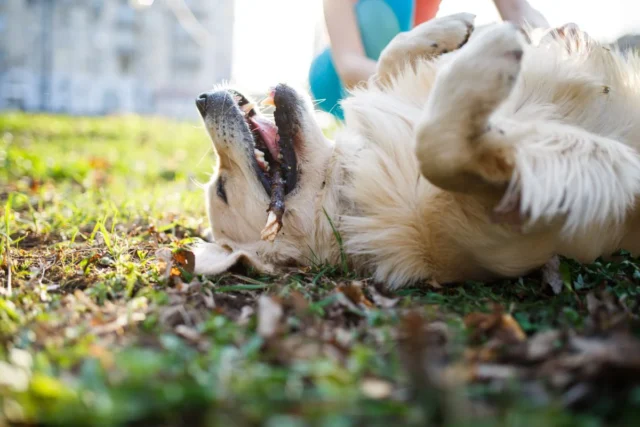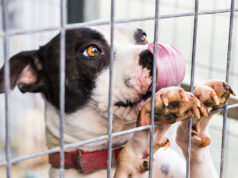
Itchiness, also called pruritus, in dogs is a common problem, especially in hot weather and during the summer. It can be challenging to see your dog scratching all over his body. There can be many reasons for this. The good news is that there are many different ways to treat them. This guide lists some common causes and what you can do about them.
What Are the Symptoms of Itchiness in Dogs?
If you notice that your dog is scratching or licking itself more than usual, it could be a sign of an underlying medical condition. Some common symptoms include:
- Scratching or biting at their skin.
- Redness, irritation, and inflammation of the skin.
- Hair loss in areas where they itch the most.
- Excessive licking at their paws or other areas on their body.
If you see these signs in your dog’s behavior, it’s essential to get them checked out by a veterinarian as soon as possible so they can determine what may be causing this problem and help treat it effectively.

What Are the Common Causes of Itchiness in Dogs?
There are many things that can cause pruritus. Here are some of the common ones:
Fleas
If you have a dog and it’s itching, the most likely cause is fleas. Fleas are tiny parasites that live on your dog’s skin and feed on its blood. They can cause severe itching and other problems like tapeworms, ehrlichiosis, and Lyme disease.
The first step in dealing with fleas is to ensure your pet has none. If you suspect your dog has fleas but haven’t seen any on its fur yet, take him/her to the vet for an examination. The vet will look closely at the pet’s fur for signs of larvae or eggs. These may be difficult to spot unless they move around under bright light.
Next, check for adult insects by gently combing through their coat with a fine-toothed flea comb or using sticky tape placed over areas where many insects might be hidden inside thick hair shafts near joints such as elbows or knees. According to a recent study published in the MDPI journal, Ctenocephalides felis was the most common flea species that affected 62 out of 108 dogs in a sample study.
If your dog has an allergic problem, you must visit a veterinarian. The vet may prescribe some antibacterial medication. He or she may also give medication like Apoquel to control the itching sensation.
Apoquel for dogs is an itching sensation reliever that prevents the itching signals from reaching the brain. This helps with fast itch relief within a few hours. This medication is effective for flea allergies, food allergies, atopic dermatitis, and other allergic problems.
Bacterial Infection
Another common cause of itching is a bacterial infection. Staphylococcus, a bacteria in the nose and skin, usually causes this type of infection. If your dog’s immune system isn’t strong enough to fight off this type of infection, it can lead to sores or boils on their skin that will itch like crazy.
Fungus, yeast infections, parasitic infections like fleas or ticks, and allergic reactions to things like pollen in the air or food allergens like wheat gluten in dog food brands can also cause bacterial infections. A study from the NCBI website states that canine atopic dermatitis and inflammatory diseases are common skin problems affecting 10% of the canine population.

Food Allergies
Food allergies are the most common cause of itching in dogs. The symptoms can be mild to severe, depending on how severe your dog’s food allergy is and if other health issues are involved.
Common symptoms include:
- Skin rashes or redness
- Hair loss on the body, face, and tail
- Scratching at their skin until they bleed or make it raw
Suppose you believe your dog has a food allergy. In that case, I recommend doing an elimination diet with them where you remove all of their regular foods from their diet for two weeks while adding new foods back in slowly, one at a time, so that we can see which foods may be causing problems for them individually before reintroducing other potential culprits like grains/starches, etc.
According to a study published on the NCBI website, every dog can have some food allergy. The study was performed by testing the saliva and blood samples of around 30 dogs. It was found that all 30 dogs were allergic to one food.
Hives
Hives are raised, itchy areas of skin that several things can cause. The most common cause is an allergy to food or environmental allergens like grass and pollen. Hives can also be triggered by fleas or certain medications, including heartworm-preventative medications.
If your dog has hives, he’ll likely scratch at his skin until he bleeds, but not because he’s trying to relieve itching. Instead, this behavior helps spread the histamine around their bodies so that more blood vessels become involved in fighting off allergens such as fleas or pollen dust mites.

Environmental Dermatitis
Environmental dermatitis is a general term for skin problems caused by environmental factors. The most common causes of environmental dermatitis in dogs are fleas and other insects, food ingredients, and chemicals in the air or water.
Allergies are one of the most common reasons a dog will start itching. Environmental allergies can be seasonal or year-round and caused by plants, pollens, grasses, molds, house dust, mites, fleas, ticks, etc. In addition to itching, there may be other symptoms, such as sneezing, coughing, lethargy, hives, vomiting, diarrhea, etc.
One of the most common factors leading to pruritus due to environmental allergies is Interleukin-31. It is found to be a common itching sensation inhibitor in a study published on the NCBI website.
How to Treat Itchiness in Dogs
- Wash the dog’s bedding. If you suspect your dog’s itching is caused by something in his environment, wash all his bedding and toys with hot water and soap.
- Bathe the dog with a gentle shampoo. The next step is to bathe your puppy using a hypoallergenic shampoo for dogs with allergies or sensitive skin. This will help reduce his reaction to any irritants that might be causing him discomfort on his skin and reduce any excess oils in his fur, so he doesn’t feel quite so itchy anymore.
- Use antihistamines and topical steroids if they’re needed. Suppose your pup isn’t feeling better after trying the above steps. In that case, you may want to consider getting some over-the-shelf medications. As mentioned earlier, Apoquel is a common medication for relieving itchiness.
- Allergen immunotherapy is also a way to treat itchiness in Dogs. An Online Wiley Library journal study shows that the efficacy of subcutaneous allergen immunotherapy is 50% in atopic dogs.

Conclusion
Itching is a common problem in dogs and can be frustrating. Fortunately, many treatments can help relieve your dog’s itching. If you think your dog might be suffering from an allergic reaction or hives, call your veterinarian immediately so they can prescribe appropriate medication and start treatment right away.









